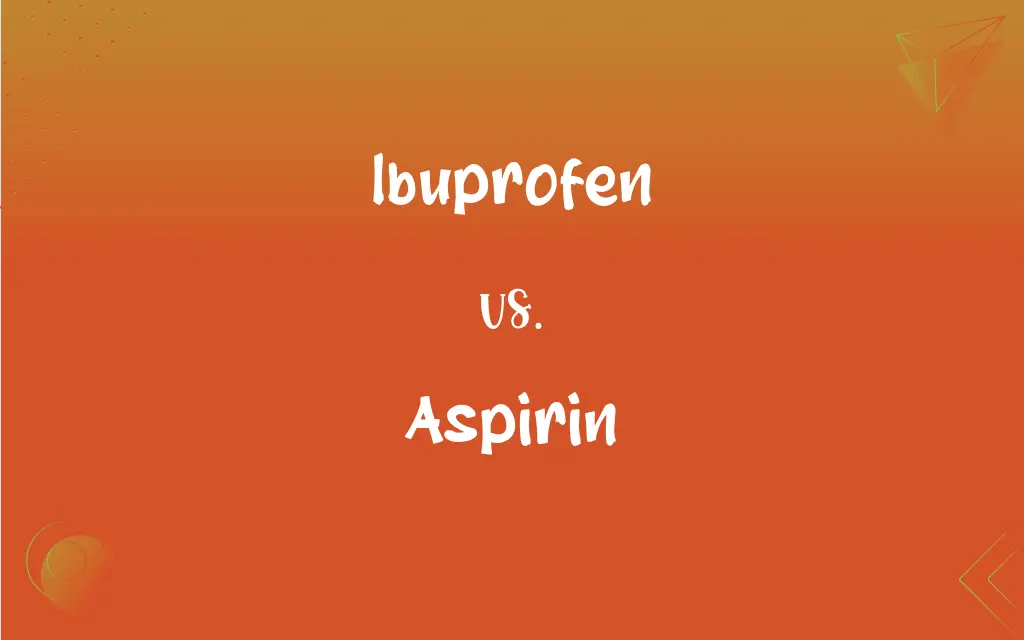Ibuprofen vs. Aspirin: What's the Difference?
Edited by Janet White || By Harlon Moss || Updated on October 30, 2023
Ibuprofen is a non-steroidal anti-inflammatory drug for pain and inflammation, while aspirin is an NSAID used for pain, fever, and blood thinning.

Key Differences
Ibuprofen, a non-steroidal anti-inflammatory drug (NSAID), is commonly used for pain relief, reducing inflammation, and lowering fevers. Aspirin, also an NSAID, is utilized for similar purposes but has a significant role in preventing blood clots.
While ibuprofen is often prescribed for short-term pain management such as headaches, muscle aches, or arthritis, aspirin is recommended for long-term prevention of heart attacks and strokes due to its antiplatelet effects. Ibuprofen’s anti-inflammatory properties make it a go-to for conditions like menstrual cramps and dental pain. Aspirin, aside from pain relief, is widely used for its cardiovascular benefits, especially in low doses.
The mechanisms of ibuprofen include blocking the production of prostaglandins, substances that promote inflammation and pain. Aspirin works similarly but also irreversibly inhibits the function of platelets, contributing to its blood-thinning properties. Ibuprofen is typically advised to be taken every 4-6 hours as needed, whereas aspirin regimens for heart health are often a daily low-dose prescription.
While ibuprofen can be used by most people, it’s not recommended for individuals with certain health conditions, such as severe heart disease. Aspirin, although beneficial for heart health, can increase the risk of bleeding and isn't suitable for everyone, particularly those with a history of ulcers.
Comparison Chart
Primary Use
Pain relief, anti-inflammatory.
Pain relief, blood thinner.
ADVERTISEMENT
Mechanism of Action
Blocks prostaglandin production.
Inhibits platelets, blocks prostaglandins.
Dosage Frequency
Every 4-6 hours as needed.
Often daily for heart health.
Notable Benefits
Effective for inflammation.
Prevents blood clots, heart health.
Precautions
Not suitable for severe heart disease.
Increased bleeding risk, not for those with ulcers.
Ibuprofen and Aspirin Definitions
Ibuprofen
Anti-inflammatory drug.
Ibuprofen is often prescribed for arthritis.
ADVERTISEMENT
Aspirin
Blood-thinning medication.
His doctor prescribed aspirin for blood thinning.
Ibuprofen
Over-the-counter pain reliever.
He bought ibuprofen for his toothache.
Aspirin
Preventative for cardiovascular events.
Daily low-dose aspirin is for heart health.
Ibuprofen
NSAID for pain and inflammation.
She took ibuprofen to alleviate her headache.
Aspirin
NSAID for pain, fever, and inflammation.
She used aspirin to reduce her fever.
Ibuprofen
Medication for reducing fever.
Ibuprofen helped lower his high fever.
Aspirin
Over-the-counter analgesic.
Aspirin can effectively relieve headaches.
Ibuprofen
Non-steroidal, non-addictive analgesic.
Ibuprofen is a safe choice for minor pains.
Aspirin
Pain reliever and antiplatelet.
Aspirin can help prevent heart attacks.
Ibuprofen
A nonsteroidal anti-inflammatory drug, C13H18O2, commonly used for its analgesic and antipyretic properties.
Aspirin
A white, crystalline compound, C9H8O4, derived from salicylic acid and commonly used in tablet form to relieve pain and reduce fever and inflammation. It is also used as an antiplatelet agent. Also called acetylsalicylic acid.
FAQs
What are common uses of aspirin?
Pain relief, fever reduction, and blood thinning.
Can ibuprofen reduce fever?
Yes, it's effective in lowering fevers.
How often can you take ibuprofen?
Usually every 4-6 hours as needed.
What is ibuprofen used for?
Pain relief, reducing inflammation, and lowering fevers.
Is aspirin a blood thinner?
Yes, it has antiplatelet properties.
Should aspirin be taken with food?
It's advised to minimize stomach upset.
How does aspirin prevent blood clots?
By irreversibly inhibiting platelet function.
Who shouldn't take aspirin?
Those with bleeding disorders, ulcers, or certain allergies.
Is ibuprofen an NSAID?
Yes, it's a non-steroidal anti-inflammatory drug.
Is aspirin safe for children?
No, it should be avoided due to the risk of Reye's syndrome.
What are the side effects of aspirin?
Possible stomach upset, increased bleeding risk.
Can ibuprofen be used for headaches?
Yes, it's effective for headache relief.
Should aspirin be taken daily?
Low doses are often prescribed daily for heart health.
What category does aspirin fall into?
It's an NSAID with blood-thinning properties.
Is aspirin good for heart health?
Yes, in low doses, it can prevent heart attacks.
How does ibuprofen work?
By blocking the production of prostaglandins.
Can you take ibuprofen and aspirin together?
It's generally not recommended without doctor's advice.
Can children take ibuprofen?
Yes, in age-appropriate doses.
Can ibuprofen cause stomach issues?
Yes, it can irritate the stomach lining.
Are there risks with long-term ibuprofen use?
Yes, including gastrointestinal and heart risks.
About Author
Written by
Harlon MossHarlon is a seasoned quality moderator and accomplished content writer for Difference Wiki. An alumnus of the prestigious University of California, he earned his degree in Computer Science. Leveraging his academic background, Harlon brings a meticulous and informed perspective to his work, ensuring content accuracy and excellence.
Edited by
Janet WhiteJanet White has been an esteemed writer and blogger for Difference Wiki. Holding a Master's degree in Science and Medical Journalism from the prestigious Boston University, she has consistently demonstrated her expertise and passion for her field. When she's not immersed in her work, Janet relishes her time exercising, delving into a good book, and cherishing moments with friends and family.































































